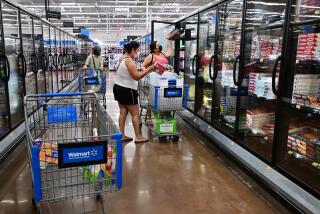AN ANEMIC RECOVERY : Consumer Confidence Drops Sharply in July : Economy: Growing worries about jobs are behind the decline in the Conference Board index, analysts say.
WASHINGTON — Consumer confidence in the economy plunged in July, according to a closely watched private survey released Tuesday, and analysts attributed the unexpectedly steep decline to growing concern about jobs.
The Conference Board reported that its consumer confidence index fell to 61.0 in July, down 11.6 points since June. It was the biggest month-to-month decline since October, 1991. The results are based on interviews with 5,000 consumers across the country.
“These low figures reflect the worry, the uncertainty,” said Murray Weidenbaum, an economist with the Center for the Study of American Business. “People keep reading about layoffs, and they wonder if their job will be the next to be hit. It’s pervasive.”
The unemployment rate hit 7.8% last month, highest in more than eight years. California’s unemployment rate jumped to 9.5%.
“June was a lousy month, there are no two ways about it,” said Larry Kudlow, an economist with the brokerage Bear Stearns & Co.
The Conference Board numbers are consistent with a Los Angeles Times Poll, released this month, that found that only 19% of respondents nationwide expected the economy to improve in the subsequent three months, down from 28% in March.
Although several private economists cited concern about job security as the main reason for declining consumer confidence, they offered different assessments of its implications.
On top of the unemployment figures, said Kudlow, consumers are reacting to the record federal deficit, the perceived threat of higher taxes and a stock market that has begun to show signs of weakness.
“Average working people are not convinced that this is a full-fledged recovery,” he said. “I think it’s killing Bush.”
Some economists speculated that the chorus of criticism against Administration economic policy heard during this month’s Democratic National Convention contributed to the sharp decline in confidence. But the Conference Board said two-thirds of the respondents were interviewed before the convention, which began July 13.
In the July survey, 44% of respondents said they believed that jobs are hard to get, while fewer than 6% said they considered jobs plentiful. In July, 1989, 33% said jobs were plentiful and only 19% said they were hard to find.
In addition, 33% of participants in the latest survey said business conditions in their own communities are bad, while 11% rated conditions good. And 22.5% predicted that fewer jobs will be available six months from now, while 14% expect more employment.
Fabian Linden, executive director of consumer research for the Conference Board, said he believes that consumers respond to what they see around them, not to statistics they hear about in the media.
“Ordinary people are not economists. They report what they experience,” Linden argued. “They have friends, relatives, neighbors who have lost jobs. They walk down Main Street and see another store closed.”
The confidence index is lowest in areas where the economy is weakest, such as New England and the Pacific states.
Consumer confidence in the Pacific region fell from 68.4 in June to 56.6 in July, the Conference Board said.
In a separate report released Tuesday, the Labor Department said worker pay and benefits increased by just 0.8% in the second quarter. In the 12 months ending in June, salaries and benefits rose 3.6%, down from 4.6% the previous year.
Although the numbers reflect relatively modest wage gains for U.S. workers, several economists said the figures have positive implications for the economy as a whole.
“That’s a healthy number,” said Kudlow. “Labor expense is an important ingredient in the bottom line.”
Lower labor costs make American corporations competitive in the international market, he argued, and bigger profits inevitably lead to more jobs.
“I wouldn’t be surprised if the second half of the year showed more growth than many people expect,” he added.
Consumer Confidence
From a monthly survey of 5,000 U.S. households
Index (1985 = 100)
Jan., 1991: 77.7
Jan., 1992: 61.0
Source: The Conference Board
More to Read
Inside the business of entertainment
The Wide Shot brings you news, analysis and insights on everything from streaming wars to production — and what it all means for the future.
You may occasionally receive promotional content from the Los Angeles Times.










